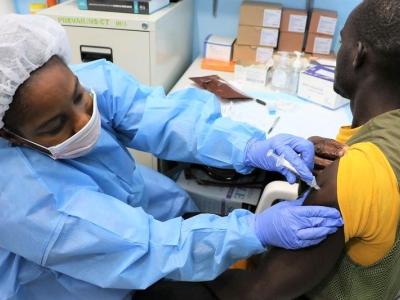Nov 22, 2005 (CIDRAP News) – Federal health officials today proposed rule changes to make it easier for public health authorities to keep travelers from bringing infectious diseases into the United States or spreading them between states.
The changes would require airlines and ship operators to report passengers who have certain signs of illness and to keep lists of passengers for at least 60 days after arrival, the Centers for Disease Control and Prevention (CDC) announced. The proposed rules also expand the definition of ill travelers to include those with influenza-like illness, and they provide more specific legal protections for people placed in quarantine.
The Department of Health and Human Services has authority to use isolation and quarantine to keep people with any of nine infectious diseases out of the country. Pandemic influenza was added to the list of diseases this year; the others are cholera, diphtheria, tuberculosis, plague, SARS (severe acute respiratory syndrome), smallpox, yellow fever, and viral hemorrhagic fevers.
The proposed rule changes are largely a result of the SARS experience in 2003, when the CDC had a lot of trouble tracking down and alerting passengers who had been on flights with suspected SARS case-patients, officials said.
"The absence of rapid electronic passenger manifests completely paralyzed our ability to notify people who were on board with suspected SARS cases," Dr. Marty Cetron, director of the CDC Division of Global Migration and Quarantine, said in a teleconference today.
After the SARS outbreak subsided, the CDC analyzed what changes were needed in the disease-control regulations incoming concerning travelers. "Existing communicable disease regulations are outdated, have not kept up with advances in disease control measures, and have not been substantially updated for over 25 years," the agency said in a news release.
Cetron said the proposed regulations would require airlines and passenger ship lines to keep an electronic list of passengers for 60 days after arrival and be prepared to provide it to the CDC in a day or less. The rule also would apply to interstate airline flights between large and medium-sized cities, he said.
In the past, passenger lists often have been purged within 48 hours, and if a disease threat emerged after the fact, it became very difficult to recover passenger names and contact information and seating charts, Cetron explained. Health officials sometimes had to go through customs forms to get the information, "an extremely time-consuming process even for a single flight," he said.
The proposal also calls for airlines to ask passengers to provide post-arrival contact information for potential use by public health officials, though this would be voluntary, Cetron said. "We're asking airlines to come up with a proposal for how they would accomplish this," he said.
The CDC is "hopeful and optimistic" that most people would accept assurances that the information would not be used for other than public health purposes, Cetron added.
The updated regulations also require "the captain of a conveyance" (pilot or ship captain) to report to the CDC any passenger who has certain signs and symptoms suggesting one of the nine diseases of concern, Cetron said. "It's best if they do this before landing, to allow for pre-positioning of medical personnel," he said.
The definition of ill passengers who must be reported has been expanded to include those with influenza-like illness, meaning those with fever, cough, and sore throat, Cetron told reporters.
As things stand now, he explained, sick travelers are not usually reported until well after their trip and generally are identified through traditional public health surveillance. "What we have now is a very passive system that we can occasionally enhance with awareness and education," such as giving lists of illness signs to airline personnel, he said.
He was unable to say how many reports of ill passengers the CDC has received in a typical year.
The new regulations also include more detailed due-process rules for people placed in quarantine because of exposure to a disease, Cetron said. The existing rules have "largely been silent on the specifics" of legal protections for people subject to quarantine.
The proposed rules empower authorities to hold a person for 3 days, after which a formal decision must be made whether to quarantine or not, he said. In addition, there must be an opportunity for a hearing before an independent arbiter.
Also included in the proposed changes is "explicit authority to offer vaccination, prophylaxis, and other appropriate medical interventions on a voluntary basis" to people in quarantine, according to a CDC fact sheet.
The proposed rules are to be published in the Federal Register, and the CDC will accept comments on them for 60 days. (See links below for the regulations and information on submitting comments.)
See also:
CDC page for proposed regulations
http://www.cdc.gov/ncidod/dq/nprm/index.htm
CDC fact sheet, including addresses for comments on the regulations
http://www.cdc.gov/ncidod/dq/nprm/docs/ControlofCommunicableDiseasesfactsheetfinal.pdf


















